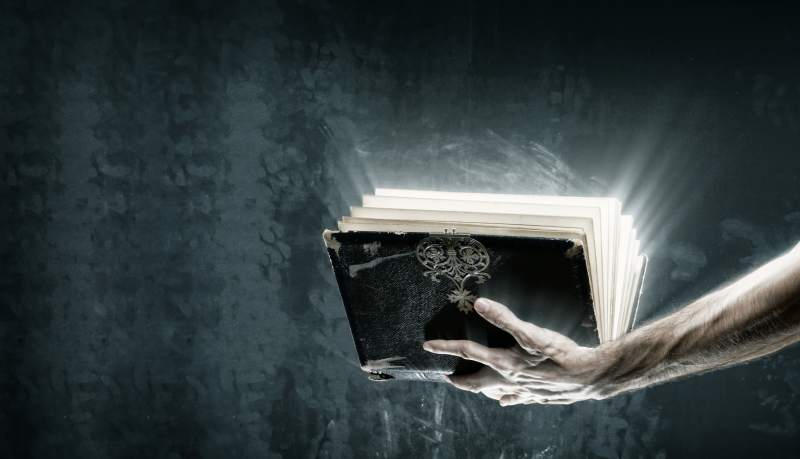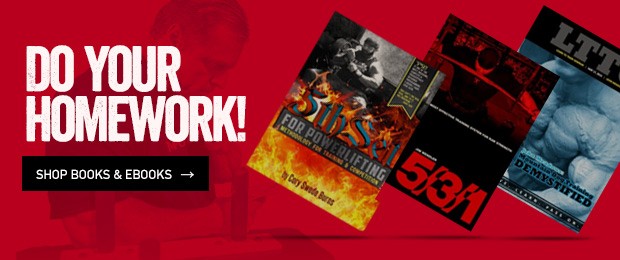
I started reading—seriously reading—around 1999. Back in those days, my reading was pretty light. I read every article that Louie Simmons ever wrote and pretty much anything else I could get my hands on that had to do with lifting. One of the first books I read for self-improvement was Poliquin Principles. It was a true game changer for me, as it made me realize how little I knew.
We're now entering the year 2017, and I realized that I've been reading seriously for as long as some of my athletes have been alive. I've read everything from the classic self-help books to fiction classics to Ultimate Athlete Concepts' newest releases. I post some of what I read on social media. I do this for a couple reasons—I want to remember what I've read, and I want others to get their minds working.
Ever since I started posting what I read, I get an email or text at least once a week asking me, "What should I read?" The emails or texts are normally funny. They remind me of someone coming to grips with being an alcoholic. Basically, the person tells me he has to confess that he doesn't read and wants to know what he should read. I'm probably the worst person on earth to answer the question, "what should you read." Everything and anything.
Each time my answer is a little different. Here's a small example of how I might respond: "Great question! Thanks for thinking of me when you ask this question. Now, my answer won't be what you want to hear. What should you read? You're asking the wrong question. The question should be, 'how should you read what you read?' Most people I meet read things on the surface and don't delve into what they just read. So find what interests you and find a book on that topic and read. When the book is over, if you don't have five more books in mind to read, you didn't really read that book. Now go to the library and find something."
I'm often shocked as to how people respond to this answer. Some have taken my advice and run with it while others have returned to the unfulfilled life of the nonreader. I've had people respond with, "Have you read Mind Gym?" This response usually sets me off because I have read this book and truly think it is for a middle school basketball player. I'm not putting the book down; I'm just saying that it's the start of reading. If this book constitutes your deepest reading, I highly doubt that you're reading with a curious mind.
With all this said, I'll list some books that I think everyone who coaches, leads or teaches should read. I implore you to read to think more. Read with a curious and open mind. Leadership books are great, but as Bryan Mann has said many times, stories are better than just facts. Read a story, learn something new and have more questions than when you started the book.
Here's my short list and a short explanation as to why these books matter:
- The Jungle by Upton Sinclair: This is a fiction book, but please keep an open mind. It's about immigrants in the United States in the early 20th century, and it's most widely thought of as a book about the food industry. It isn't a book about the food industry. It's a book about society. This book changed how I look at many parts of my life and how I interact with others.
- Car Guys vs Bean Counters by Bob Lutz or Icons and Idiots by Bob Lutz: I liked Cars Guys vs Bean Counters better, but both books are great for leadership. Bob Lutz has spent his career working in the auto industry, and if you don't find parallels to your athletic department, call me and I'll owe you a beer. One of my favorite lessons from Cars Guys vs Bean Counters is that a moron can always ask a question that a wise man can't answer. Explaining it better than anyone else I've ever read, Lutz explains how decisions made at the top look great but fail as they make their way down to the workers.
- The End of the Suburbs by Leigh Gallagher: If you're a strength coach, you're working with 18- to 25-year-old kids (assuming you're at a college). People love to bash this age group, but instead of bashing them, let's try to understand them. I grew up in a neighborhood where I could walk to football practice, ride my bike to school, walk to buy milk when my mom ran out and get my bike stolen when I forgot to lock it in front of the record store (the new Anthrax album was worth the bike). Many of the current suburban kids don't have this same experience. They live in 4000-square-foot homes with climate control, and they've never walked anywhere. How does this affect them and our society as a whole?
- Losing our Cool by Stan Cox. This book runs in the same vein as The End of the Suburbs. Do you want to know why most of your athletic students are coming from the sunbelt? This book will help explain what life is like and how it grew in the sunbelt region. Also, it will make you rethink how we adapt or should adapt to our current climate-controlled society.
- Collapse by Jared Diamond. Be prepared for 700 pages of tiny text and lots of information. This book is the Supertraining of sociology. Just to give some brief background information on the author, Diamond has a doctorate in physiology. This means that he knows more about the human body than we do, and he's one of the world's experts on the gallbladder. He's also one of the world's experts on Easter Island. Diamond has been referred to as a polymath, and he's well deserving of that title. In fact, read any of his books, with topics ranging from sociology and aging to sex. The morale to the story is read anything that Diamond wrote, and if you get a chance, see him speak. I saw him speak a few years ago and he is long in the tooth, so see him soon.
- The Time of Our Lives, Tom Brokaw. This is a very easy read. I was lucky enough to meet Tom Brokaw a few years ago and get my copy of his book signed. This book will motivate you to go out and make yourself or the world a better place. It's as close to a self-help book as I have on this list with some history and the story of Brokaw's life thrown in there.
- Under the Bar by Dave Tate: No, this isn't just a plug for Dave's book. Similar to the book The Time of Our Lives, we can learn from Dave's mistakes. This is a great book for young strength coaches to not only keep them motivated but to show them that success really is a journey. People think that elitefts™ is just this successful business, but they don't see Dave's very first office. I remember visiting Dave in his first office. It wasn't what elitefts™ is today. Dave built his business literally from the ground up , so learn from his successes and his failures.
- To the Last Breath by Francis Slakey: This is one of my all-time favorite books. The author, Dr. Slakey, wanted to climb the highest peak on each continent while also surfing every ocean. After I read this book, I emailed Dr. Slakey. He was very nice and helpful. I'm still waiting to meet him face to face, though. This book shows the transformation that events can have on a person, and while hopefully, our jobs are never life and death, we can still see some of the similarities between his challenges as well as ours.
I wouldn't say that these are my eight favorite books, but they are the eight books that haunt me "in the dark night of my soul." When I read these books, I don't just take what is said on the page at face value. Instead, I try to crawl into the author's head and ask about the authors why. Why did they take the path or journey that they did, and why did they make the choices that they made? This will teach you more about yourself than you may ever realize.












1 Comment